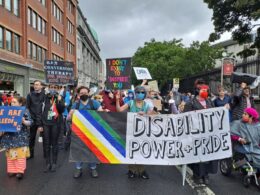By Harper Cleves
CW : Violence against women, homophobia, mentions of racism
“Two to put her down, two to put her out.” This is what the soldier Cathal Crotty boasted to his friends on Snapchat after beating Natasha O’Brien unconscious. This week he walked free from the Limerick Circuit Court, laying bare the deeply embedded misogyny of the so-called justice system and society as a whole.
On 29 May 2022, Natasha O’Brien and a friend were walking when they came across Crotty and friends waiting at a bus stop, shouting homophobic slurs and abuse at passersby. When Natasha politely asked him to stop, he lashed out. Natasha herself said her last conscious thought during the assault was “He’s not stopping. I am going to die.”
Crotty initially tried to pin the assault on Natasha until he was presented with CCTV footage demonstrating the brutality of the clearly unprovoked assault, forcing him to plead guilty. The judge in this case, Tom O’Donnell, tried to present this guilty plea as a valiant act – patronisingly asking if Natasha “understood the significance” of the guilty plea, which meant there was no trial, something that would have elongated the process by 18 months. He also took into consideration that he had “no doubt” that if the Court imposed an immediate jail sentence, Crotty’s career in the army “would be over.”
Judge O’Donnell and the Irish court system prioritised the future of yet another supposedly “promising young man,” over Natasha’s, nevermind that her victim impact statement clearly outlined that the mental distress caused by Crotty’s attack caused her to lose her job.
Rise up against gender violence, queerphobia and the far-right
This gross injustice experienced by Natasha occurs against the backdrop of the far right being on the rise in Ireland. Even the blatant homophobia on display by Crotty and his friends is evidence of the influence of those who spread hatred towards immigrants, LGBTQIA+ people, and women. In particular, they have spread lies about refugees, specifically Black and brown men, posing a danger to Irish women as “unvetted, military aged men.”
Recent statistics show gender violence is indeed on the rise, but not for the reasons the far right claims. Women’s Aid reported receiving 40,048 disclosures of domestic abuse, i.e. violence within the home by (mostly) men known to the survivors, not at the hands of immigrant strangers.
The racism at the heart of the far right’s argument is exposed by this case. Crotty is a white, Irishman, not only of military age, but actively in the army, who carried out a tremendously vicious example of on-street, stranger violence. His naked homophobia and his macho aggression in assaulting Natasha is exactly the kind of behaviour drummed up by far-right hate and the kind of future they are fighting for. The Irish state and judicial system, far from condemning this clear cut act of misogynistic violence towards a young woman, instead prioritised Crotty’s future and well-being over Natasha’s.
The profiteering and divisive logic of capitalism, which relies on women’s unpaid labour and which profits from sexualising and controlling women and queer people’s bodies, bleeds into our court system, our homes, our intimate relationships. This is the source of gender-based violence, and it is a system the far-right props up, with their queerphobic rhetoric, their racism, and, most recently, as articulated by new Kildare councillor Tom McDonnell, their desire to attack abortion rights so that Irish women can “breed.”
Build a socialist feminist movement
While the far right and the capitalist court system offer very little hope, the outrage expressed on behalf of Natasha by ordinary people of all genders across the island paints a different picture. This rage recalls the push back against victim blaming in the courts in 2018 in the wake of the Belfast rugby rape trial and in the midst of the eventually victorious fight for abortion rights.
If we harness this outrage on the streets, in our workplaces, our schools and our colleges we can do what the far right never could, and never aims to; challenge the status quo and implement socialist feminist change for the collective good of society – eliminating capitalism’s need for hateful, divisive, and exploitative bigotry.












